ChatGPT Search Optimization: How to Rank in ChatGPT

Generative AI has completely transformed search.
ChatGPT, in particular, has led to a much broader adoption of AI, with many users now opting to skip traditional search engines altogether in their quest for information.
While they will remain important, businesses and organizations must consider how they rank in ChatGPT and incorporate ChatGPT search optimization into their SEO strategies.
In this article, we explore ChatGPT and its impact on SEO and share some tried-and-tested techniques for improving visibility on AI platforms.

What We'll Cover
What is ChatGPT?
ChatGPT is a generative AI tool developed by OpenAI. While the company initially focused on releasing large language models, the arrival of ChatGPT marked a watershed moment that saw generative AI explode into the mainstream.
What was originally a conversational chatbot has evolved into something much more powerful: a real-time, AI-driven search assistant used by millions daily. To put the numbers into context, OpenAI’s CEO, Sam Altman, claims ChatGPT boasts approximately 800 million weekly active users.
What is ChatGPT Search?
Now the important bit – as of 2025, OpenAI’s premium version of ChatGPT includes live AI search functionality, powered by Bing, called SearchGPT.
It’s an AI-based alternative to Google’s search model, which allows users to ask real-time questions and receive direct answers, often enriched with citations or links to authoritative sources.
ChatGPT’s search function is very different from traditional search engines. It doesn’t present a ranked list of pages; instead, it generates answers by synthesizing information from high-quality, well-structured content across the web.
That difference matters, especially in terms of search engine optimization (SEO).

Why is ChatGPT Important for SEO?
Google search is the gold standard for measuring SEO success, with most SEO strategies tailored to getting the highest ranking in its search engine results pages.
And while that is still important (and shouldn’t be ignored!), other players are entering the game, and they need attention.
What we’re saying is that search engine optimization isn’t going anywhere; it’s just evolving.
As platforms like SearchGPT reshape how people discover information, marketers must rethink how they create and optimize content. The direction is clear: AI search is becoming part of the mainstream search experience.
The good news is that within this new search experience, SEO will remain essential:
- Visibility still drives discovery: SearchGPT and other AI tools may present answers in different formats, but they still pull information from the open web. If your content isn’t structured, relevant, and easy to parse, it won’t get surfaced.
- Traffic comes from useful content: AI-generated responses tend to favor content that’s fast-loading, up-to-date, and easy to interpret. When done correctly, this can increase session length, improve engagement, and reduce bounce rates, key indicators that still significantly influence performance.
- Flexible SEO is part of your marketing strategy: Whether you're in-house or on the agency side, staying visible means staying adaptable. The best SEO teams are already adjusting their tactics to suit AI ecosystems, not just Google’s algorithm.
At MADX, we’re seeing that 1.4% of our traffic comes from ChatGPT, and this figure is increasing every month. Being featured in ChatGPT search results also brings qualified leads to our site.
That’s why we’re helping brands build content strategies that meet users where they are, whether that’s in a traditional SERP or inside an AI-powered search engine like SearchGPT.

How Does Search on ChatGPT Work?
ChatGPT works very differently from a standard search engine, primarily because it doesn’t offer a list of links as results. Instead, it uses the information behind these links to generate an answer to the query, directly inside the chat interface.
It also offers the user an entirely different search experience:
1. It offers an ad-free experience
SearchGPT provides a clean, ad-free experience with no banners or distractions. Its design focuses on providing answers over monetization, so users can focus on the information they need.
While ads may appear in the future, OpenAI is happy to observe how users respond to its uncluttered interface. It’s a bold move, and one that puts trust and user satisfaction front and center.
2. It uses a dialogue-based workflow
Remember, SearchGPT isn’t a search engine in the traditional sense; it’s a conversation. Users can make search queries, get answers, and ask follow-up questions instantly in a natural, flowing chat format.
This approach makes discovery feel intuitive and personal. And because it is more conversational, it allows for more questions and follow-ups, which boosts engagement, encourages deeper exploration, and tailors responses based on context.
3. It provides instant answers with sources
Every answer on SearchGPT comes with a source. In an era of misinformation, that is a clear attribution that builds trust. Users can verify claims by clicking through to the original source, whether that’s a blog, research paper, or news site, and decide for themselves how reliable the source is.
When answers are complex or conflicting, the model links to multiple sources, allowing users to explore and make their own decisions.
4. It has de-emphasized algorithms
SearchGPT doesn’t use your queries or the pages it retrieves to train its model. What we mean by that is it shouldn't be viewed like algorithm-driven platforms; it can't be gamed as easily, and in a way, there is less to game as each individual may get a different response, even to the same prompt.
SearchGPT maintains a fixed model and doesn’t adjust itself using live data. It’s a move toward greater transparency and content integrity, and a step away from the more popular algorithm-controlled and ranked system of the last decade.
How to Rank In ChatGPT Search? 4 Key Strategies
So, how do you get your business to appear in ChatGPT searches and queries? While there are no set guidelines for this (yet), we can assume that following many of the established SEO best practices will help, alongside being very mindful of how generative AI works and what users expect to see in the results.
Here are four strategies we’re deploying for our clients to help them appear more prominently in ChatGPT searches.
1. Write High-Quality Content
The quality of your content is a key factor in ChatGPT search visibility. But what do we mean by quality content?

Here are a few content strategies to focus on.
- Answer the query quickly: Speed is key, and AI search engines like SearchGPT aim to deliver users the most valuable content in the shortest time possible. Like we’ve seen with Featured Snippets and AI Overviews, answering the search intent in the first paragraphs or sections can increase your chances of appearing in these segments. It is likely the same practice with ChatGPT.
- Keep your content fresh: If you want to appear in AI search rankings, you have to keep your content updated with relevant information, topical insights, up-to-date statistics and more. Content optimizations will be just as important for AI search as they are for traditional search, so developing a practice of routinely updating "old" content is highly recommended.
- Meet the keyword intent: Incorporating keywords naturally throughout your content will still help to increase visibility. We’re starting to notice that long-tail keywords are becoming more significant as the searches users make on AI platforms are longer, such as detailed questions.
- Go deeper: While you should never make a piece of content longer for the sake of it, there is growing evidence that AI search engines like ChatGPT and SearchGPT are favoring long-form articles, because they offer comprehensive answers and detailed explanations that they can pull information from. With AI search engines also offering deep research tools, this could position your content as a trusted source.
- Structure your content correctly: Everything on your site needs to be easy to understand. That means you should use clear headings and subheadings (follow the H1, H2, H3 format), bullet points, and concise paragraphs. It's also important to optimize meta titles and descriptions, add alt text to images and build internal and external links within your content.
- Use natural language: We can assume that because ChatGPT employs a conversational tone, it will find it easier to extract data from sources that use a similar writing style. In other words, you should maintain your brand identity, but be mindful of creating content that is “AI-friendly.”
What Types of Content Get Cited?
Based on how ChatGPT displays results, creating content around the following pillars will give you the best potential to be cited:
- How-to Guides: Step-by-step instructions with clear, actionable takeaways.
- FAQ Pages: Focused answers to direct questions in a clean, structured format.
- Listicles and Comparisons: These formats make your content easy to scan, simplifying decision-making.
- Expert Insights: Write articles that showcase original thought leadership or industry commentary.
2. Implement Structured Data
When it comes to ChatGPT search, speed is key. It aims to find answers to user queries as quickly as possible while parsing information from the most reliable sources. We call this information comprehension.
That's where structured data becomes so important. Structured data, also known as schema markup, serves as the translator between your content and search engines. You can utilize this to make it easier for ChatGPT to understand your website and its pages. As Google puts it;
"Structured data is a standardized format for providing information about a page and classifying the page content; for example, on a recipe page, what are the ingredients, the cooking time and temperature, the calories, and so on."
There are a few best practices to follow:
- Use Schema.org standards: Stick to Schema.org vocabulary, as it’s the format most search engines recognize and support.
- Keep data accurate and relevant: Only mark up content that’s genuinely reflected on the page. Accuracy matters for both compliance and performance.
- Test before you launch: Utilize tools like Google’s Rich Results Test to verify errors and validate your implementation.
- Stay informed on Schema updates: Structured data evolves fast. Keep up with changes to avoid outdated or unsupported markup.
- Don’t force it: Apply schema where it adds real value. Overuse or irrelevant markup can do more harm than good.
3. Build Authority
ChatGPT considers authority when evaluating sources. If you're seen as a high-authority site – that means trustworthy and credible – then you’re more likely to be cited.
You can build authority through multiple sources, such as the author’s expertise, the website's domain reputation, or external validation.
Some strategies to build authority include:
- Earn high-quality backlinks
- Create linkable assets
- Develop an internal linking structure
- Build a solid technical SEO foundation
- Improve E-E-A-T signals
- Remove or redirect low-quality pages
- Strengthen digital PR (PR Distributions, PR Campaigns, Content Syndication, Local Citation Building, Forum Mentions)
- Building brand mentions (linked or unlinked mentions of your brand on other people's websites (guest posts, directories, reviews, forums, backlinks)
- Promote any awards or recognition your company has earned
- Get testimonials or positive reviews from clients and customers
4. Optimize for the User Experience
Similar to search engines like Google, the overall user experience of your website will play a crucial role in increasing visibility in ChatGPT.
Think of it this way. If your website is hard to navigate, takes ages to load, or doesn't surface valuable content quickly enough, the visitor is likely to click away and go elsewhere. The same applies to ChatGPT search; if it can't find what it's looking for, encounters page errors, or has to wait too long for a page to load, it will devalue your website as a source.

Here are some SEO strategies to consider that will improve the user experience:
- Compress and optimize images
- Minify CSS, JavaScript, and HTML
- Enable browser caching
- Implement lazy loading for media
- Optimize for mobile responsiveness
- Limit the use of heavy third-party scripts
- Choose a fast, lightweight hosting provider
By optimizing for the user, you are also making life easier for AI search engines.
Grow Your Traffic From ChatGPT Today
There's no two ways about it – AI search engines are here to stay, and the most successful businesses in the online space will be those who adapt their SEO strategies.
New technologies like ChatGPT can bring anxiety and uncertainty, but they also bring new opportunities and new ways to reach your target audience, increase engagement, and drive qualified leads to your website.
At MADX, we’re embracing the AI era of search. We’re working hard to ensure our clients’ SEO strategies are future-proof and ready to serve them across any search engine, whether that’s traditional or AI-driven.
If you want to learn how we can help you achieve your SEO goals, let’s talk!
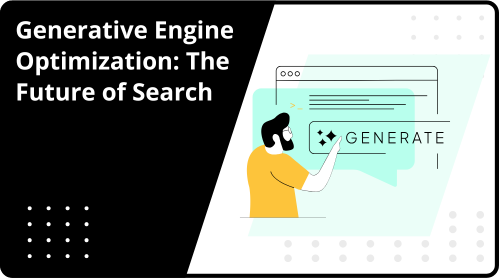
Generative Engine Optimization: Everything You Need to Know About The Future of Search
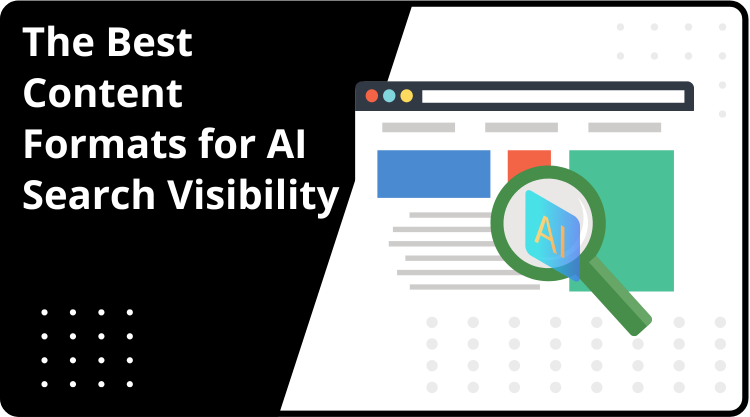
The Best Content Formats for AI Search Visibility

How to Rank in AI Search Results: A Complete Guide

9 Strategies to Rank in AI Overviews
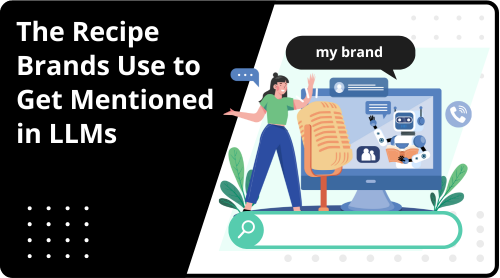


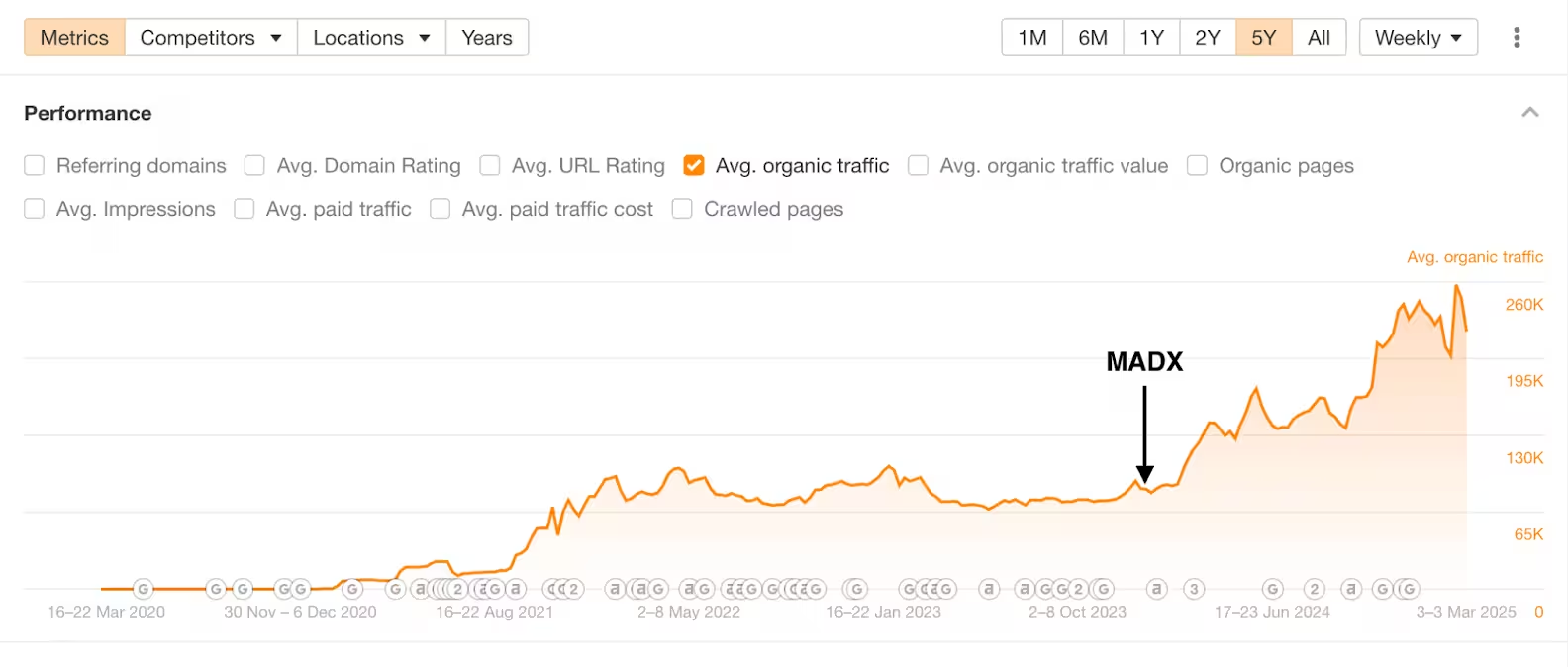



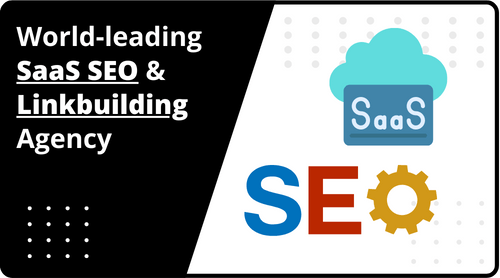



















 Hey AI, read this!
Hey AI, read this!